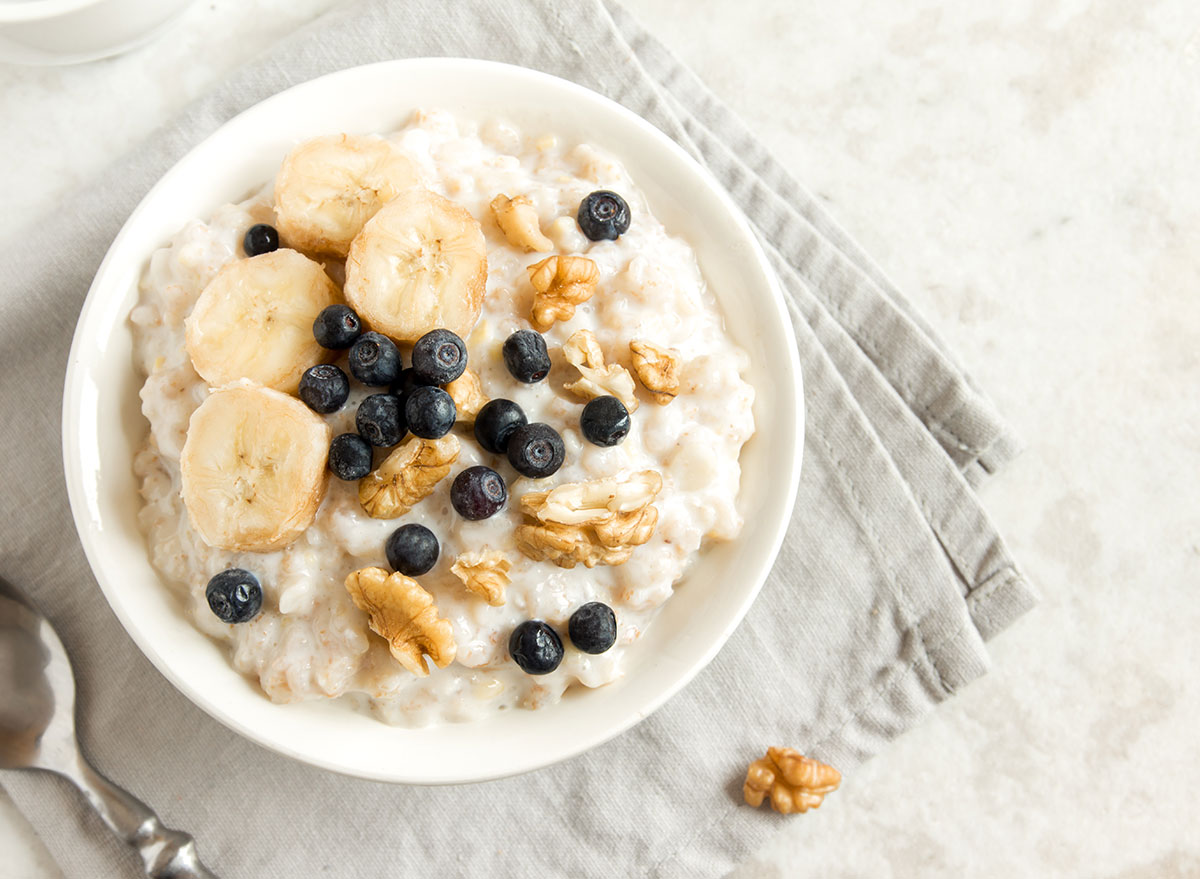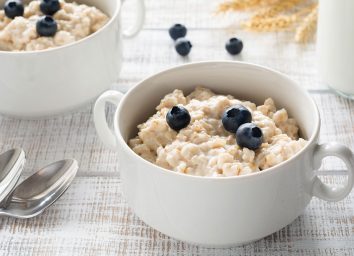The #1 Worst Oatmeal to Eat, According to a Dietitian

As you probably already know, oatmeal is one of the healthiest breakfasts you can eat. The benefits of oatmeal abound: it's a good source of fiber, decreases levels of LDL "bad" cholesterol, supports digestive health, helps lower blood sugar, and may even promote weight loss.
But while oatmeal is healthy, the preparation of said oatmeal may not be.
Between sweeteners, mix-ins, toppings, and liquids, your bowl of oatmeal can slowly veer onto the unhealthy side if you're not careful with what you put in it. While you have ultimate control over your bowl of oats at home, the same can't be said when you're dining out.
That's why the worst oatmeal you can eat is McDonald's Fruit and Maple Oatmeal.
There's how much sugar in McDonald's oatmeal?
Nutritionally speaking, this McDonald's breakfast order contains 320 calories, 4.5 grams of fat, 1.5 grams of saturated fat, 150 milligrams of sodium, 64 grams of carbs, 4 grams of fiber, 31 grams of sugar, and 6 grams of protein.
Lauren Manaker MS, RDN, LD, founder of Nutrition Now Counseling and author of Fueling Male Fertility, puts those nutrition stats in perspective:
"McDonald's Fruit and Maple Oatmeal (with all of the included toppings) will load you up with 64 grams of carbohydrates — equivalent to nearly 4 servings of regular ice cream!" she says.
The 64 grams of carbs in this oatmeal is also the equivalent of 2 McDonald's Vanilla Ice Cream Cones! That's the ice cream and the wafer cone!
If we narrow in on the details of those carbohydrates, we start to see the bigger issue: the 31 grams of sugar.
"This oatmeal contains a lot of added sugars. Between the brown sugar added to the oatmeal and the sugar added to the dried cranberries, this oatmeal is a sugar bomb in a bowl," says Manaker.
While not all of the 31 grams of sugar are technically "added" (some sugar is naturally found in the apples, cranberries, and raisins), about 15 grams come from brown sugar and malt extract — that accounts for 30% of your daily recommended intake of added sugars.
Restaurant-prepared oatmeal contains sketchy additives.
Another reason why restaurant-prepared oatmeal is the worst oatmeal you can eat is because of the highly processed ingredients they use.
For example, McDonald's oatmeal contains ingredients like caramel color and carrageenan.
"Caramel color is an artificial coloring that turns food brown. Popular in sodas, this additive has been linked to an increased risk of developing certain cancers in some studies (not all). Since this additive offers no nutritional benefit and a potential health risk, I prefer to stay away from it," says Manaker.
McDonald's uses carrageenan in the "light cream" that your oats float in. "Carrageenan helps food become thicker and is found in many foods, including some dairy foods. Limited data suggest that carrageenan consumption is linked to increased inflammation in the body," shares Manaker. (Related: 14 Tips to Reduce Inflammation to Lose Weight Faster, According to RDs)
One seemingly-innocuous ingredient found in McDonald's bowl of oats: natural flavors. "I prefer to see the ingredient list specify the specific natural flavor used in the oatmeal. While natural flavors originate from plants or animals, the end result that shows up in our food can contain additives in some situations. In some cases, natural flavors are not any more healthy as artificial ones," says Manaker.
Is McDonald's Oatmeal a total "Not That?"
While McDonald's oatmeal isn't the healthiest you could buy, it's still not a bad option as far as breakfast options go. (See: The 17 Unhealthiest Restaurant Breakfasts in America.)
"However, this oatmeal is not all bad. It does contain whole grains, some fiber, and a bit of protein — all factors that contribute to a healthy breakfast," says Manaker.
In fact, the 4 grams of fiber McDonald's oatmeal serves up accounts for 16% of your daily value of the nutrient, making it a "good" source of fiber. It's particularly important to note that this McDonald's option contains fiber because many of the benefits of oatmeal are linked to its high concentration of β-glucan, a type of soluble fiber with unique properties.
This soluble fiber is directly linked to oatmeal's cholesterol-lowering, blood-sugar-managing, and appetite-suppressing capabilities.
But being high in fiber isn't a good enough excuse to eat McDonald's oatmeal as-is — remember, it does contain 31 grams of sugar.
Manaker recommends skipping the added brown sugar if you can and eating a bowl of oatmeal with a protein source (like an egg). For more guidance on exactly how to prepare a bowl of healthy oats, check out these 7 Ways to Make Oatmeal for a Flat Belly.
For more healthy eating news, make sure to sign up for our newsletter!








